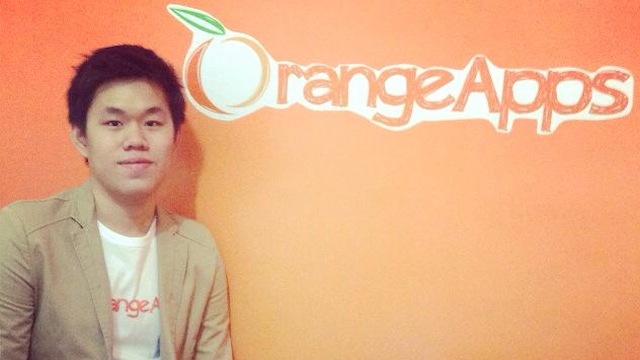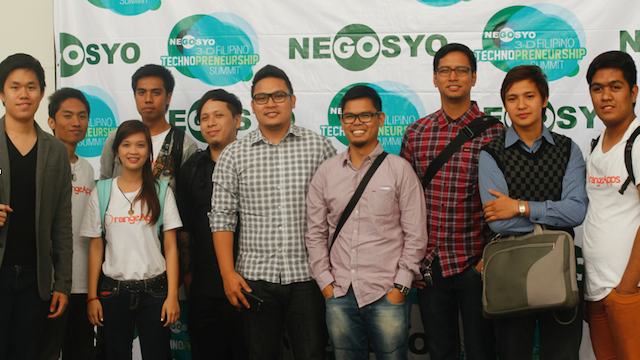SUMMARY
This is AI generated summarization, which may have errors. For context, always refer to the full article.

MANILA, Philippines – Gian Javelona is the CEO of OrangeApps, which recently released a new product, Khawna. He also happens to be 20 years old. Thus, any discussion of the former is marked by its contrast with the latter: How did someone ascend to such a high position at such a young age?
To begin with, he has always wanted to be an entrepreneur, even if the people around him were not so supportive. He said, “When I was a student, I always dreamed of having a company. I wanted to build something that any person could use and a product that could change people’s lives.”
Javelona continued, “I remember my classmates were laughing at me when I told them that one day I would have a company that will beat Apple and that I will name it OrangeApps.” Luckily for the landscape of Philippine entrepreneurship, Javelona did not let the doubters deter him from his dreams.
Ideaspace incubation
In January of 2013, Javelona applied and was accepted to the incubation program at Ideaspace Foundation. He fondly recounted, “I remember when I presented my vision to Coach Chot Reyes and Manny V. Pangilinan, I was just wearing a regular t-shirt. I also didn’t know that I had to present my financial projections and business model – I didn’t even understand what those words meant back then.”
Javelona found his experiences at Ideaspace life-changing. In fact, he recommends the incubation route for those who may not know much about building a startup, but have the wherewithal to see a particular idea come to life.
He said, “Ideaspace has helped me a lot in terms of incorporation, financial projections, valuations, and marketing – through them you will meet the best people in the industry, including entrepreneurs, technologists, social innovators, and other aspiring startup founders.”
Javelona emphasized the need to surround yourself with these type of people because we all learn through osmosis. He received this piece of wisdom from one of his Ideaspace mentors, Earl Martin Valencia. Javelona said, “Sir Earl Valencia said that I need to spend most of my time with the best people so that I can be someone like them.”
This can-do attitude has also helped Javelona attract the right talent for his OrangeApps team, in spite of the skepticism that may come with having a 20-year old CEO at the helm. He is indeed acutely aware of these doubts.
Javelona said, “Building my OrangeApps team was the most difficult experience I ever had. Who would join a 20-year old CEO with a very young company? Who would join a company where there is no assurance you will have a salary in the coming months? Who would join a company that you haven’t heard before?”
Javelona was able to overcome any such doubts by “building the company like someone would build a family – you have to make sure there is chemistry.” The best evidence that he was able to do just that is in their new product: Khawna.
Khawna defined
The name “Khawna” is inspired by the Tagalog phrase ikaw na (you already), which is said in jest to a person who has achieved something great. It also fits in with their slogan “It starts with you,” as Javelona believes that “all of us can make a difference in the world.”
How does each person unlock their true potential? Javelona believes it begins with how education is conducted in the Philippines, which is not necessarily up to par. It too often neglects the fact that it is pushing students toward a job marketplace where employability rests on skills that are changing every year.
Javelona described Khawna as “a learning platform where you could learn the skills that are needed in the industry. In doing so, it bridges the gap of industry learning and makes education available to everyone around the world.”
The platform will offer classes that emphasize hard skills, such as “science and technology, engineering, mathematics, and entrepreneurship.” This all sounds good in theory, but it’s Javelona’s description that makes the potential of this platform fully clear.
He said, “Imagine a kid in a rural area attending a class on entrepreneurship from his mobile phone, one taught by industry experts. What will happen to the Philippines? There are 7.93 million underemployed Filipinos and 6.24 million out of school, young Filipinos. With Khawna, we can make every Filipino employable.”
Entrepreneurship advocacy
At the end of every interview for this column, I usually give the interviewee a chance to address anything not addressed by my questions. In his case, Javelona wanted to make it a point to celebrate other companies in the Philippine startup scene.
Javelona said, “I’m really happy to see successful startups operating in this country, such as Kalibrr, Guestlist.ph, and TimeFree Innovations. They inspire young startup founders to keep pushing forward – They help us realize that disrupting industries here in the Philippines will lead the country to a better future.”

This comment fits in with Javelona’s biggest advocacy: youth entrepreneurship. He speaks frequently to Filipino youth and he encourages them to consider going the entrepreneurial route. The biggest challenge, again, comes back to education.
Javelona said, “I think education is the main problem. All of us are molded to be employees – not employers. If you ask a student today, what they want to do after graduation, most will say that they want to work for a big, local company or go abroad and earn big money.”
Thus, when Javelona speaks to students, he always reminds students of how those huge tech companies started. He said, “What I always tell students is all of those tech companies like Microsoft and IBM started the way we started. They were built by human beings like us. So it’s not impossible for Filipinos to also build a billion dollar company in the future.”
For many students, when they hear Javelona speak, it’s the first time they hear that they can do something other than fight for entry-level jobs for recent graduates. Javelona said, “For the first time they see a Filipino company who wants to build something that can definitely change lives. I always tell them that ‘the sooner you start the faster you will learn.’ I hope that inspires them.”
Many Filipinos are indeed so taken by Javelona’s message that they want to work for OrangeApps or even start their own companies themselves. Some have been Khawna’s earliest supporters, intent as they are on using the platform to gain the skills they need to become future leaders, innovators, and entrepreneurs in the Philippines.
To me, therein lies the most exciting part of Javelona’s Khawna: While an exciting product in its own right, it also points – and one would hope, leads – to future innovation in the Philippines, tracing it does to our most important resource as a country: our youth. – Rappler.com
Rappler business columnist Ezra Ferraz graduated from UC Berkeley and the University of Southern California, where he taught writing for 3 years. He now consults full-time for educational companies in the United States. He brings you Philippine business leaders, their insights, and their secrets via Executive Edge. Follow him on Twitter: @EzraFerraz
Add a comment
How does this make you feel?
There are no comments yet. Add your comment to start the conversation.